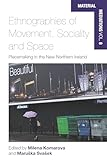Ethnographies of Movement, Sociality and Space : Place-Making in the New Northern Ireland / ed. by Maruška Svašek, Milena Komarova.
Material type: TextSeries: Material Mediations: People and Things in a World of Movement ; 8Publisher: New York ; Oxford : Berghahn Books, [2018]Copyright date: ©2018Description: 1 online resource (310 p.)Content type:
TextSeries: Material Mediations: People and Things in a World of Movement ; 8Publisher: New York ; Oxford : Berghahn Books, [2018]Copyright date: ©2018Description: 1 online resource (310 p.)Content type: - 9781785339370
- 9781785339387
- 306.09416 23
- online - DeGruyter
| Item type | Current library | Call number | URL | Status | Notes | Barcode | |
|---|---|---|---|---|---|---|---|
 eBook
eBook
|
Biblioteca "Angelicum" Pont. Univ. S.Tommaso d'Aquino Nuvola online | online - DeGruyter (Browse shelf(Opens below)) | Online access | Not for loan (Accesso limitato) | Accesso per gli utenti autorizzati / Access for authorized users | (dgr)9781785339387 |
Frontmatter -- Contents -- List of Figures -- Acknowledgements -- Introduction. Spatiality, Movement and Place-Making -- 1. Growing Up with the Troubles: Reading and Negotiating Space -- 2. Crafting Identities: Prison Artefacts and Place-Making in Pre- and Post-ceasefire Northern Ireland -- 3. ‘Recalling or Suggesting Phantoms’: Walking in West Belfast -- 4. ‘Women on the Peace Line’: Challenging Divisions through the Space of Friendship -- 5. ‘You Have No Legitimate Reason to Access’: Visibility and Movement in Contested Urban Space -- 6. ‘Lifting the Cross’ in West Belfast: Enskilling Crucicentric Vision through Pedestrian Spatial Practice -- 7. Engaging amid Divisions: Social Media as a Space for Political Intervention and Interactions in Northern Ireland -- 8. Belfast’s Festival of Fools: Sharing Space through Laughter -- 9. Criss-crossing Pathways: The Indian Community Centre as a Focus of Diasporic and Cross-Community Place-Making -- 10. Sushi or Spuds? Japanese Migrant Women and Practices of Emplacement in Northern Ireland -- 11. Refugees and Asylum Seekers in Belfast: Finding ‘Home’ through Space and Time -- Afterword. Cupar Way or Cupar Street: Integration and Division around a Belfast Wall -- Index
restricted access online access with authorization star
http://purl.org/coar/access_right/c_16ec
Exploring the complex dynamics of twenty-first century spatial sociality, this volume provides a much-needed multi-dimensional perspective that undermines the dominant image of Northern Ireland as a conflict-ridden place. Despite touching on memories of “the Troubles” and continuing unionist-nationalist tensions, the volume refuses to consider people in the region as purely political beings, or to understand processes of placemaking solely through ethnic or national contestations and territoriality. Topics such as the significance of friendship, gender, and popular culture in spatial practices are considered, against the backdrop of the growing presence of migrants, refugees and diasporic groups.
Mode of access: Internet via World Wide Web.
In English.
Description based on online resource; title from PDF title page (publisher's Web site, viewed 25. Jun 2024)


